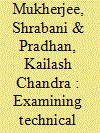| Srl | Item |
| 1 |
ID:
159805


|
|
|
|
|
| Summary/Abstract |
The study estimates the technical efficiency (TE) of agricultural production in India using production frontier model for both cross-section and panel data for the years 1999 and 2007. Given the persistent low productivity of agriculture in India, there is a serious need to identify the determining factors for technological lock-in for agricultural production in order to accelerate sustainable productivity and technical efficiency. The model claims that farmer’s education, household’s production process, proportion of irrigated area covered by canals, availability of wells, yielding variety of lands, government services, agricultural expenditure by local government and women reservations in local government significantly contribute to efficiency in resource utilization in farm production. Traditional techniques such as ‘learning by doing’ is, generally, preferred than the adoption of new technologies for agricultural production. It makes a constraint of technological lock-in.
|
|
|
|
|
|
|
|
|
|
|
|
|
|
|
|
| 2 |
ID:
142826


|
|
|
|
|
| Summary/Abstract |
In this article, we present a choice function of a rural household relating to her/his ward’s schooling. It makes an empirical evaluation on the basis of a simple theoretical framework using a primary data set surveyed from two backward districts of West Bengal. It explores the underlying causes of wards’ discontinuation of school by examining the choice function of the parents using ordered probit analysis. The likelihood of dropout is higher at the primary level for low-income households and significantly depends on parents’ attributes, which are mostly endogenous in an educational production function, and other exogenous difficulties in accessing school. It is also triggered by a lack of expectation about the future impact of education on a child’s life.
|
|
|
|
|
|
|
|
|
|
|
|
|
|
|
|